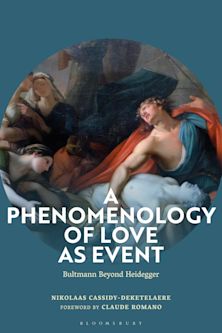The Religious Existentialists and the Redemption of Feeling
The Religious Existentialists and the Redemption of Feeling
This product is usually dispatched within 1 week
- Delivery and returns info
-
Free US delivery on orders $35 or over
Description
Traditional philosophizing has generally depended upon reason as its primary access to truth. Subjective experiences such as feelings, the passions, and emotions have typically been viewed as secondary to reason, untrustworthy, or both. The Religious Existentialists and the Redemption of Feeling revisits how the movement of existentialism, via the religious existentialists, has contributed to a rethinking of the role of subjective experience, in contrast to the rationalist and idealist traditions, thus reframing the importance of feelings in general for the philosophical enterprise as a whole. Through the considerations of a variety of thinkers, this collection provides a fresh look at the contributions of twentieth-century existentialists, thereby re-contextualizing the very notion of existentialism, offering a powerful and genuine re-evaluation of the significance of subjectivity, and underscoring the continued relevance of the religious existentialists.
Table of Contents
2.Intellectual Ascent and Experience in Dante’s Divine Comedy – Antonio Donato
3.More Than a Feeling: Kierkegaard’s Redemption of Love – Michael Strawser
4.James and Nishida: A Phenomenology of Mystical Consciousness – J. Jeremy Wisnewski
5.Nicholas Berdiaev: Towards a New Humanism, Based on a New Concept of Being Human – Emiliya Ivanova
6.Max Scheler’s Concept of Shame as a Preconceptual Revelation of the Ontological Status of the Human Person – Marc Barnes
7.The Necessity of Feeling in Unamuno and Kant: For the Tragic as for the Beautiful and Sublime – José Luis Fernández
8.The Redemption of Negative Feeling: Miguel de Unamuno – Mariana Alessandri
9.“Not a ‘Feeling’ But a Perceived Mystery”: Martin Buber and the Redemption of Feeling in I-Thou Relationships – Eugene V. Torisky Jr.
10.The Bared Self: Levinas and the Hassidic Tradition – Catherine Chalier
11.Beyond Reason: Emmanuel Levinas on Sensation, Feeling, and Morality – Randolph Wheeler
12.Does Faith Trouble Philosophy? On Franz Rosenzweig’s Method and System – Herman J. Heering
13.The Relevance of Karl Jaspers’s Philosophy Of Religion Today – Anton Hügli
14.Philosophy, Prophecy, and Existential Hope: Marcel in the Broken World of the 21st Century – Jill Hernandez
15.The Unifying Force of Emotion: Human Nature, Community and the World – Nikolaj Zunic
16.Love, Leisure, and Festivity: Josef Pieper on the Passions of Love and the Contemplation of God – Margaret I. Hughes
17.Feeling Distant, Feeling Divine: The Transformative Import of Differences in Nietzsche and Irigaray – James Abordo Ong
Product details
| Published | Jun 27 2019 |
|---|---|
| Format | Hardback |
| Edition | 1st |
| Extent | 274 |
| ISBN | 9781498584760 |
| Imprint | Lexington Books |
| Dimensions | 9 x 6 inches |
| Publisher | Bloomsbury Publishing |
Reviews

ONLINE RESOURCES
Bloomsbury Collections
This book is available on Bloomsbury Collections where your library has access.



































